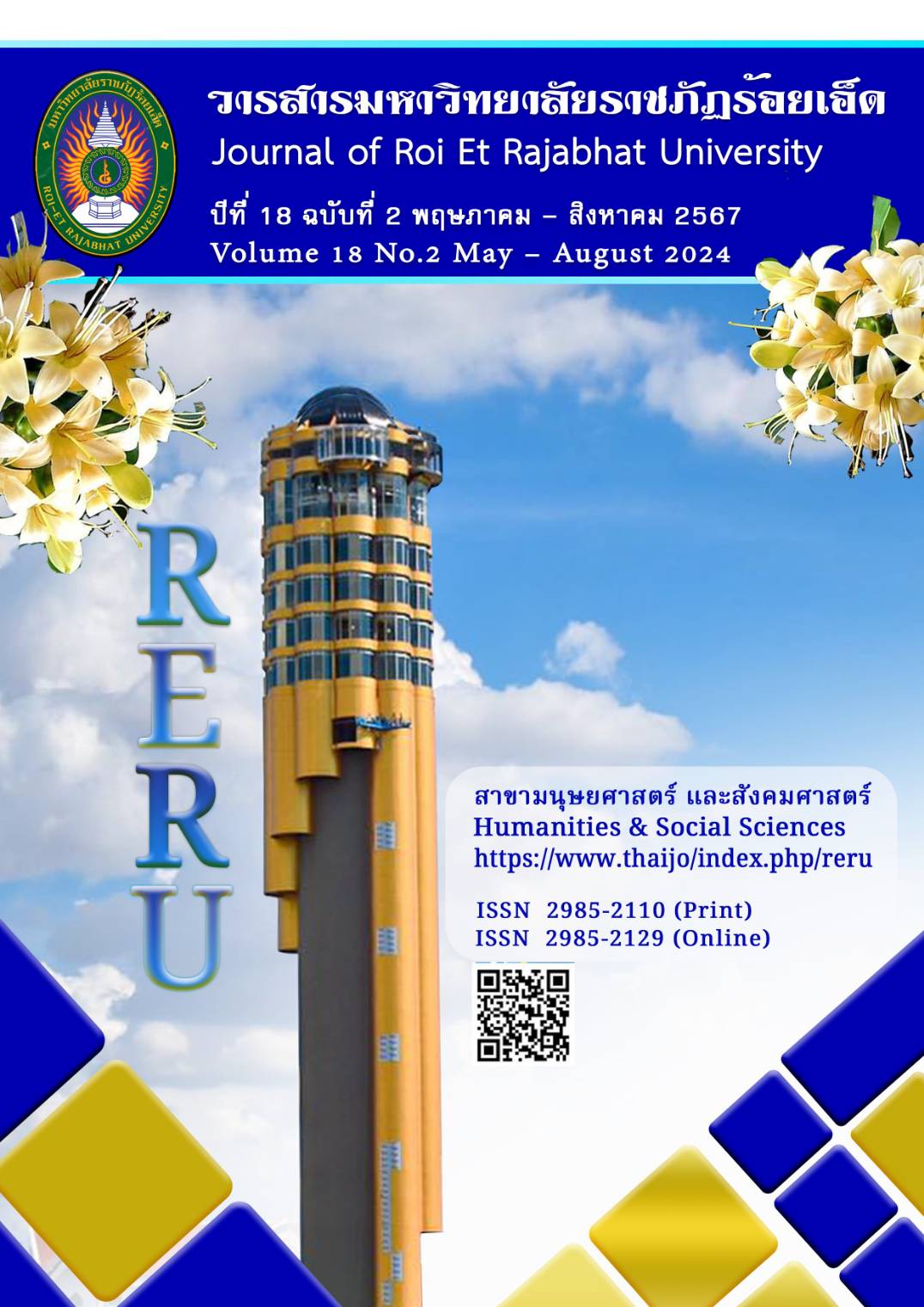The Relationship and Impact of Sustainable Marketing Management on Marketing Success of the Organic Agriculture in Roi Kaen Sara Sin Provincial Cluster
Keywords:
Sustainable marketing management, Marketing success, Organic farmingAbstract
The purposes of this research were: 1) to test the relationship between sustainable marketing management and marketing success, and 2) to test the impact of sustainable marketing management on marketing success. The samples were 156 farmers of organic farming in Roi Kaen Sara Sin provincial cluster who were certified for Thailand Organic by Department of Agriculture, Ministry of Agriculture and Cooperatives. The research instruments used in collecting data was a questionnaire. Data were analyzed using descriptive statistics, correlation analysis, and multiple regression analysis. The results found that 1) sustainable marketing management; customer response focus, environment change awareness, social-oriented product development related to marketing success, and 2) sustainable marketing management; customer response focus and environment change awareness had positive influence on marketing success of organic farming in Roi Kaen Sara Sin provincial cluster with statistically significant at the 0.05 level.
The conclusion of this research findings could be applied by farmers of organic farming as to adapt elements of sustainable marketing management. Especially, giving importance to the commitment to develop and improve products to meet customer needs, always managing limited resources to achieve maximum benefit. Along with giving importance to changing the methods of working in agricultural fields that do not cause any real impact on the environment in the agricultural fields and the community, it will be able to create customer satisfaction, resulting in marketing success.
References
กรมวิชาการเกษตร กระทรวงเกษตรและสหกรณ์การเกษตร. (2565). ระบบตรวจสอบรับรองแหล่งผลิตอินทรีย์. สืบค้นเมื่อ 12 มีนาคม 2565, จาก http://organic.doa.go.th/homepage
กลุ่มงานบริหารยุทธศาสตร์ กลุ่มจังหวัดภาคตะวันออกเฉียงเหนือตอนกลาง. (2566). ข้อมูลการพัฒนากลุ่มจังหวัด. สืบค้นเมื่อ 26 มีนาคม 2565, จาก http://osmnortheast- c.moi.go.th
ชูศักดิ์ เดชเกรียงไกรกุล. (2558). การวางแผนธุรกิจ. กรุงเทพฯ: ซีเอ็ดยูเคชั่น.
บุญใจ ศรีสถิตนรากูร. (2550). ระเบียบวิธีการวิจัยทางพยาบาลศาสตร์ (พิมพ์ครั้งที่ 4). กรุงเทพฯ: จุฬาลงกรณ์มหาวิทยาลัย.
ศิริจรรยา เครือวิริยะพันธ์. (2562). แนวทางการจัดการตลาดอย่างยั่งยืน: ผลิตภัณฑ์เกษตรอินทรีย์ เพื่อผู้บริโภค สังคม และสิ่งแวดล้อม. วารสารเกษตรพระจอมเกล้า, 36(3), 23-31.
สุธิดา เลขาวิจิตร์. (2564). การพัฒนาผลิตภัณฑ์จากข้าวเพื่อการส่งเสริมการตลาดของวิสาหกิจชุมชน กลุ่มแม่บ้านเกษตรกรนาเกตุ อำเภอโคกโพธิ์ จังหวัดปัตตานี. Journal of Modern Learning Development,7(1), 200-216.
สำนักควบคุมพืชและวัสดุการเกษตร. (2557). ปริมาณการนำเข้าปุ๋ยเคมีของไทยปี พ.ศ.2556: รายงาน กรมวิชาการเกษตร. กรุงเทพฯ: กระทรวงเกษตรและสหกรณ์.
สมคิด ทองช่วย อัจฉรา เกษสุวรรณ และรวิพิมพ์ ฉวีสุข. (2565). ปัจจัยสู่ความสำเร็จเพื่อการตลาดที่ยั่งยืนในอุตสาหกรรมผ้าไหมไทย. วารสารสมาคมวิจัย, 26(4), 142-160.
อังคาร คะชาวังศรี และจุฑาทิพย์ พหลภาคย์. (2564). บริบทของการบริหารตลาดสมัยใหม่ ภายใต้แนวคิดการทำงานแบบอไจล์. วารสารบริหารธุรกิจศรีนครินทรวิโรฒน์, 12(2), 139-151.
Aaker, D. A., Kumar, V. and Day, G. S. (2001). Marketing research. New York: John Wiley and Sons.
Enriquez, H, G., Montesdeoca, E, C., Navalon, J, G. and Gelashvili, V. (2023). Social Networks, Sustainable, Satisfaction and Loyalty in Tourist Business. Applied Technologies, 1(2), 69-81.
Fuxman, L., Mohr, I., Mahmoud, A. B and Grigorious, N. (2022). The new 3Ps of sustainability marketing: The case of fashion. Sustainable Production Consumption, 31(1), 384-396.
Hair, J. F. Jr., Black W. C., Babin B. J., Anderson R. E. and Tatham R. L. (2010). Multivariate data analysis (6th ed.). New Jersey: Pearson Education International.
Jamrozy Ute. (2007). Marketing of tourism: A paradigm shift toward sustainability. International. Journal of Culture Tourism and Hospitality Research, 1(2), 117-128.
Ministry of Agriculture and cooperatives. (2017). The Agricultural Development Plan under the Twelfth National Economic and Social Development Plan (2017-2021). Retrieved April 4, 2022, From https://www.moac.go.th/moaceng-magazine-preview-422991791792
Nunnally, J. C. and Bernstein, I. H. (1994). Psychometric theory. New York: McGraw-Hill.
Rovinelli, R. J. and Hambleton, R.K. (1977). On the Use of Content Specialists in the Assessment of Criterion-Referenced Test Item Validity. Tijdschrift Voor Onderwijs Research, 2(1), 49-60.
Sheth, J, N. and Parvatiyar, A. (2021). Sustainable Marketing: Market-Driving Not Market-Driven. Journal of Macro marketing, 4(1),150-165.
Tollin, K, and Christensen, L, B. (2019). Sustainability Marketing Commitment: Empirical insights. About Its Drivers at the Corporate and Functional Level of Marketing. Journal Business Ethics. 156(4), 1165-1185.
Downloads
Published
How to Cite
Issue
Section
License
Copyright (c) 2024 Roi Et Rajabhat University

This work is licensed under a Creative Commons Attribution-NonCommercial-NoDerivatives 4.0 International License.
บทความที่ได้รับการตีพิมพ์เป็นลิขสิทธิ์ของวารสารมหาวิทยาลัยราชภัฎร้อยเอ็ด
ข้อความที่ปรากฏในบทความแต่ละเรื่องในวารสารวิชาการเล่มนี้เป็นความคิดเห็นส่วนตัวของผู้เขียนแต่ละท่านไม่เกี่ยวข้องกับมหาวิทยาลัยราชภัฎร้อยเอ็ด และคณาจารย์ท่านอื่นๆในมหาวิทยาลัยฯ แต่อย่างใด ความรับผิดชอบองค์ประกอบทั้งหมดของบทความแต่ละเรื่องเป็นของผู้เขียนแต่ละท่าน หากมีความผิดพลาดใดๆ ผู้เขียนแต่ละท่านจะรับผิดชอบบทความของตนเองแต่ผู้เดียว





